- Home
- Patricia McLinn
Warm Front
Warm Front Read online
WARM FRONT
Seasons in a Small Town
Book 4 (Winter)
Patricia McLinn
*
For news about upcoming books, subscribe to Patricia McLinn’s free newsletter.
Get all the books in Patricia McLinn’s Seasons in a Small Town series today!
Book 1 (Spring): What Are Friends For?
Book 2 (Summer): The Right Brother
Book 3 (Autumn): Falling for Her
Book 4 (Winter): Warm Front
If you like Patricia McLinn’s small-town romance stories, try her Marry Me series now!
Book 1: Wedding of the Century
Book 2: The Unexpected Wedding Guest
Book 3: A Most Unlikely Wedding
Book 4: Baby Blues and Wedding Bells
Copyright © Patricia McLinn
ISBN: 978-1-944126-12-4
EPUB Edition
www.PatriciaMcLinn.com
*
Dear Readers: If you encounter typos or errors in this book, please send them to me at [email protected]. Even with many layers of editing, mistakes can slip through, alas. But, together, we can eradicate the nasty nuisances. Thank you! — Patricia McLinn
Table of Contents
Cover
Title Page
Copyright Page
Chapter One
Chapter Two
Chapter Three
Chapter Four
Chapter Five
Chapter Six
Chapter Seven
Chapter Eight
Chapter Nine
Chapter Ten
Chapter Eleven
Chapter Twelve
Chapter Thirteen
Chapter Fourteen
Chapter Fifteen
Chapter Sixteen
Chapter Seventeen
Chapter Eighteen
Chapter Nineteen
Chapter Twenty
Chapter Twenty-One
Chapter Twenty-Two
Chapter Twenty-Three
Chapter Twenty-Four
Chapter Twenty-Five
Chapter Twenty-Six
Chapter Twenty-Seven
Chapter Twenty-Eight
Epilogue
The Seasons in a Small Town Series
About the Author
CHAPTER ONE
Anne Hooper ignored the implications of a grumbling rattle in the engine as she bumped her seventeen-year-old compact over the cattle guard, down a drive where gravel was merely a rumor, and into the farmyard.
Just as she’d been ignoring other implications since leaving another fruitless meeting and heading home this dreary late December afternoon.
She was too weary to deal with implications.
It wasn’t at all like the muscle drained tiredness that lasted from planting through harvest. This was a blank-brained numbness.
Well, maybe not entirely blank, because her brain had spotted an unfamiliar car parked by the back porch.
She blinked at it.
It wasn’t just unfamiliar. It was downright strange.
Not only was it not a pickup, van, or modest sedan — the common modes of transportation on the farms that surrounded Drago, Illinois — but it had lightly tinted windows, protrusions like curvy fins, and a glossy finish that had clearly never been besmirched by that haunting mixture of combining dust and cow dung.
Heck, this car didn’t look as if it knew what dirt was, much less manure.
So what was it doing outside her farmhouse?
Well, her farmhouse was stretching it.
The two-story frame structure that was rapidly forgetting what paint felt like belonged to her late husband’s great-uncle, Everett Hooper.
Still, it was her home, too. The home she was working her ass off to hold onto, despite days like this.
Nope, wasn’t going to let those implications in to her head. Not until she had the energy to wrestle them to the ground.
Until then, she would put one foot in front of the other.
Which, at the moment, involved climbing three steps to the enclosed back porch that served as a mudroom, then into the kitchen beyond it.
“ ’Bout time you got home, young lady,” Everett groused the moment she walked in.
Maybe he’d been concerned about her. Maybe he’d been concerned he might have to get his own supper. Hard to tell with him.
She wouldn’t have pursued the topic, but he also didn’t give her a chance. “Got someone I want you to meet. This is Peter Quincy. Quince, this is Anne, the one I’ve been telling you about.”
Before she could take in the strange man in her kitchen — even stranger than the car outside — he stepped forward and extended his hand.
She must have automatically raised hers — encased in a mitten since the car’s heater wasn’t worth spit and she reserved her warmest gloves for farm work — because there was her green knit-clad paw, wrapped in a large, bare male hand.
Her gaze dropped. Starting from clean, leather shoes planted incongruously on the faded linoleum, she panned up creased suit pants, a perfectly fitted jacket, past a crisp white shirt and richly colored tie, and up still more to a face as finely tailored as the suit.
Her stomach dropped, a sharp plunge that should have deposited it somewhere in the cellar.
“It’s good to meet you, Anne — Ms. Hooper,” the man said with a warm smile.
“Mr. Quincy,” she responded, then found a reserve of energy to add, “I take it the car outside belongs to you?”
“You like it?” His smile turned less polished, converting to a grin. “The salesman promised it would make people think of a panther. And by extension, they’d think of me that way. Did it work?”
That salesman had been wrong.
The man didn’t gain from the car’s reflection; the man matched the car. Sleek, understated, and with the promise of power under the hood.
She pivoted away to hang her coat on its peg by the door, putting her back to the room’s other occupants.
Power under the hood?
Where on earth had that thought come from?
Wherever it had come from, it needed to go back there. Right now.
She faced the room.
“In other words, it’s built so low to the ground it’s begging for farm roads to rip out its undercarriage,” she said.
Peter Quincy’s grin flickered, then surged to full wattage. “You’re right. It wasn’t built for farm roads.”
Whatever satisfaction she might have gained from being acknowledged right — and, actually, she felt a little like someone who’d pricked a kid’s balloon — evaporated when she stepped into the room far enough to make eye contact with Everett around Peter Quincy’s broad shoulders.
Everett’s look asked the question.
She shook her head.
No, this banker hadn’t agreed to the loan they needed, either.
No, she didn’t know what she was going to do next … except to keep putting one foot in front of the other. And refuse to contemplate that the next step might be over a cliff.
“Then it’s a good thing I got Quince to come on out here,” Everett said with a nod.
Peter Quincy looked from Everett to her and back, clearly knowing he’d missed something.
Belatedly, a possibility hit her.
Oh, God, what if this man was a buyer?
That would explain her stomach-dropping reaction — instinctive fear. Fear that the world had turned upside down in the past few hours and Everett Hooper had decided to sell this farm after all.
No, wait, her sluggish brain protested. That didn’t make sense.
First, Everett would never sell. Second, this man didn’t look like any buyer she’d ever seen.
“Yup,” Everett
continued in a self-congratulatory tone. “You don’t think I have good ideas, Anne, but this was one. Sure was.”
And then she got it.
The old man had gone stark raving mad.
As if she hadn’t told him six dozen times—
“Everett.” She forced her words to crisp certainty. “You can’t be serious. What possible use could he be to me?”
“Hey.”
She ignored the stranger’s combined protest and half laugh, focusing on her great uncle-in-law, who sputtered in a good imitation of innocence.
“This has got to stop, Everett. I am fed up, and this one has got to be the most desperate, bottom-of-the-barrel—”
“Hey. I am here, you know, Ms. Hooper.”
Unlike the others, this stranger — this Peter Quincy — wasn’t going to be ignored. So she’d deal with him first, then set things straight with Everett once and for all.
And then she’d collapse.
She turned to look him up and down, pausing on his hands. Large and apparently capable, but if they’d experienced manual labor any time lately, she was a super model.
She pronounced judgment. “You’re no farmer.”
“True.”
“That’s what I meant — you’re not fit for farming. You might be fine for other things.”
“Thank you,” he said, solemnly. “I believe I am.”
She looked up sharply. His eyes were alight with laughter.
It caught at something in her. Something buried deep. Something she didn’t recognize. Or didn’t want to.
“Then you should have better sense than to listen to his fool idea.” She jerked her head at Everett.
“It didn’t seem like a fool idea when Everett suggested it,” Peter Quincy said mildly.
She propped her hands on her hips. “Oh, really? What could a man like you do on a farm like this?”
“Sleep.”
She blinked. “What?”
“Sleep. Eat breakfast, perhaps occasionally another meal.”
Before she could make sense of that, Everett erupted in wheezy laughter. “You thought I brought him in to farm? Oh, Lord, preserve me from nonsensical women.”
She spun back to the old man. “Don’t you start on me — not now.”
Apparently he recognized a woman at the end of her rope — or the edge of her cliff — because, for once, he gave a succinct explanation rather than launching into a meandering account.
“I rented the man a room, Anne. You know,” he added with a deliberation meant to warn her, “the large room at the end of the hall with its own bathroom.”
Everett met her gaze. She read his concern — several concerns, actually. Starting with the fact that the large room at the end of the hall with its own bathroom had once been the room she’d shared with her husband.
But if she’d been inclined to fall apart over such things it would have happened when they’d rented the room once before.
They hadn’t needed the money then nearly as much as they did now, and she’d been newly a widow, instead of a three-year veteran of that status.
She licked her lips.
“How much? Or—” Hope blazed. Maybe if they got enough rent, combined with her income from her part-time job at Stenner Autos… “—did you leave it to me to settle the amount?”
“No,” Peter Quincy said. “We agreed to a monthly rent.”
With hope sputtering out, she repeated, “How much?”
He named an exorbitant figure. Even higher than she’d have held out for.
Not enough to get rid of the wolf entirely, but enough to keep him on the far side of the door awhile longer.
And since minutes ago it had seemed she had no time left until the wolf battered down the door and set up camp in the middle of the kitchen, any time seemed like boundless luxury.
“Excuse me.”
She walked away from them at a reasonable pace and made it across the center hall. But when she hit the bottom of the stairs and her hand cupped over the familiar newel post, she picked up speed.
She pounded up the stairs, around the corner and into the hall bathroom, slamming the door behind her, and locking it before she burst into tears.
CHAPTER TWO
Peter Quincy had made a number of females cry in his lifetime, but never quite like this.
“What do you think you’re about young man?” demanded Everett Hooper.
Quince slowly brought his gaze back from the patch of ceiling overhead, above which he figured Anne Hooper was huddled, crying like a banshee.
“Not a thing.”
Everett squinted at him suspiciously. “You’re slick, but don’t start thinking I’m stupid. We agreed to a rent. Why’d you go and up it?”
“I hadn’t seen the farm when we agreed. It’s a much nicer situation than I expected.”
Everett’s suspicion showed no visible sign of dwindling.
Quince added, “With all the Zeke-Tech people trying to find places to stay, I knew that if someone else heard what I was paying, they’d offer more, you’d toss me out to bring them in, and I’d be right back where I started, with no place to sleep.”
The other man’s gaze eased at that self-interested explanation.
“As long as you’re not thinking thoughts you shouldn’t be thinking about Anne.”
Good God, what did the old geezer think he was? A monster?
Anne Hooper looked like she’d shatter from one good puff of wind.
Oh, she seemed physically strong enough. But thin in a way that made him think of people who’d lost weight from overwork. Or grief. That gave her face a drawn quality. And her eyes appeared over-large and almost bruised.
Her mouth, though, now that was wide and generous, meant to curve up into an inviting smile. Or to open to release soft, desperate sounds.
And despite the thinness, when she’d taken off that shapeless old coat, static electricity had molded her sweater to curves of breasts, waist, and hips that left absolutely no doubt that she was a woman … and that he was a man enjoying looking at a woman.
Okay, maybe some part of him had been thinking along the lines Everett feared, but not with any intention of ever acting on it.
It was just the basic — or base — male reaction to a female.
But Anne Hooper’s curves weren’t the reason he’d upped the rent.
Her eyes were.
Those huge, haunted, stubborn eyes that were never going to quit.
*
Everett invited him to eat with them, but Quince figured Anne didn’t need an unexpected mouth to feed.
She did need time to recover her equilibrium.
Time apart would make it easier for them both to pretend he had no idea she’d broken down in tears over the prospect of his rent.
Besides, he had things to attend to.
So he ate dinner at the café in Drago.
Then he went to Zeke and Darcie’s house to stow his important belongings into a suitcase and laptop case, joined by a couple boxes with items accumulated in the past six months of being in Drago off and on.
Splitting his time between here and Zeke-Tech headquarters in Virginia had started after Zeke — born Anton Zeekowsky — returned to his hometown last spring.
Zeke had resisted visiting Drago, the town he’d been determined to put behind him forever. But once he arrived here, he rediscovered friends and feelings — especially about Darcie Barrett.
Before long, Zeke had decided to bring a division of his hugely successful company to Drago. Quince, who’d been in on the birth of Zeke-Tech and had worked with Zeke ever since, didn’t begrudge commuting. Not considering how happy Zeke was.
With his minimal packing done, Quince went out the back door and climbed the stairs to the apartment over the garage where Zeke and Darcie were living during renovations to the main house.
This was the potentially tricky part.
Because they’d already discussed this and there’d been no consensus.
&
nbsp; He’d said that with construction wrapping up, Darcie and Zeke would move back into the main house, and as newlyweds they needed their privacy.
Neither had argued that point.
But when he’d said he’d start looking for somewhere else, their solution was to swap, with him moving out of the guest room in the main house and into the apartment when they moved out.
“It’s perfect,” Zeke said. “You’ll be right here whenever I need you.”
As CEO of Zeke-Tech, Zeke used to feel he needed Quince — his COO and best friend — constantly, to run operations while he concocted endless ideas.
But since Zeke had reconnected with Darcie there had been less demand on Quince’s time. Even with the company’s new involvement with the community and moving a division, these past months had felt nearly like a vacation to Quince.
“Being so close is probably why he wants to get away,” Darcie said dryly. “Give the man time off for good behavior.”
And that’s how they’d left it.
Quince had searched for a place over the past month, with no success because the influx of Zeke-Techers was straining Drago’s housing seams to bursting.
He had also chewed over his reaction to their offer.
Camping out sporadically in the under-construction house had been one thing. But now that moving the division was picking up speed, he’d spend considerably more time in Drago.
Setting up a more permanent residence over Zeke and Darcie’s garage — close, but not part of their happiness — grated.
That gut reaction had surprised the heck out of him.
He was genuinely happy for them.
But any doubts about the wisdom of gaining some distance ended three days ago with the celebration of Christmas.
He’d been welcomed warmly from Christmas Eve church services, through stockings and breakfast, into present-opening and a turkey dinner. He couldn’t remember a better Christmas … or one that made him feel more solitary.
As a swap-off for the upside, he’d happily live with that solitary feeling next December 25.
He just couldn’t do it every day until then.
He didn’t say any of that to Zeke and Darcie when they welcomed him into the apartment and he announced his move.

_preview.jpg) Almost a Bride (Wyoming Wildflowers Book 1)
Almost a Bride (Wyoming Wildflowers Book 1)_preview.jpg) Prelude to a Wedding (The Wedding Series Book 1)
Prelude to a Wedding (The Wedding Series Book 1) Reaction Shot (Caught Dead in Wyoming, Book 9)
Reaction Shot (Caught Dead in Wyoming, Book 9) Warm Front
Warm Front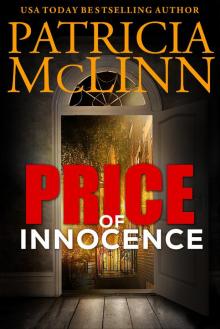 Price of Innocence
Price of Innocence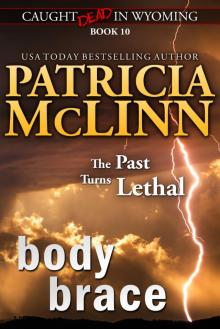 Body Brace (Caught Dead in Wyoming, Book 10)
Body Brace (Caught Dead in Wyoming, Book 10) Death on Covert Circle
Death on Covert Circle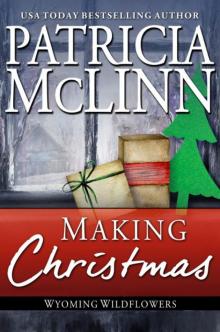 Making Christmas
Making Christmas Death on Torrid Ave.
Death on Torrid Ave. Death on the Diversion
Death on the Diversion The Rancher Meets His Match
The Rancher Meets His Match Widow Woman
Widow Woman The Runaway Bride
The Runaway Bride Hoops
Hoops A Stranger in the Family (Book 1, Bardville, Wyoming Trilogy)
A Stranger in the Family (Book 1, Bardville, Wyoming Trilogy)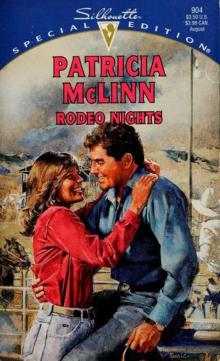 Rodeo Nights
Rodeo Nights Wedding Series Boxed Set (3 Books in 1) (The Wedding Series)
Wedding Series Boxed Set (3 Books in 1) (The Wedding Series) Sign Off (Caught Dead in Wyoming, Book 1)
Sign Off (Caught Dead in Wyoming, Book 1) Prelude to a Wedding
Prelude to a Wedding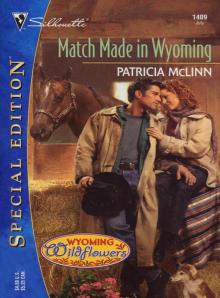 MATCH MADE IN WYOMING
MATCH MADE IN WYOMING Left Hanging
Left Hanging What Are Friends For?
What Are Friends For? Proof of Innocence
Proof of Innocence Hidden in a Heartbeat (A Place Called Home, Book 3)
Hidden in a Heartbeat (A Place Called Home, Book 3) Baby Blues and Wedding Bells
Baby Blues and Wedding Bells Least Likely Wedding?
Least Likely Wedding? Heart Stealers
Heart Stealers Grady's Wedding
Grady's Wedding Right Brother
Right Brother Wedding of the Century
Wedding of the Century Sign Off
Sign Off The Surprise Princess
The Surprise Princess Wyoming Wildflowers: The Beginning
Wyoming Wildflowers: The Beginning